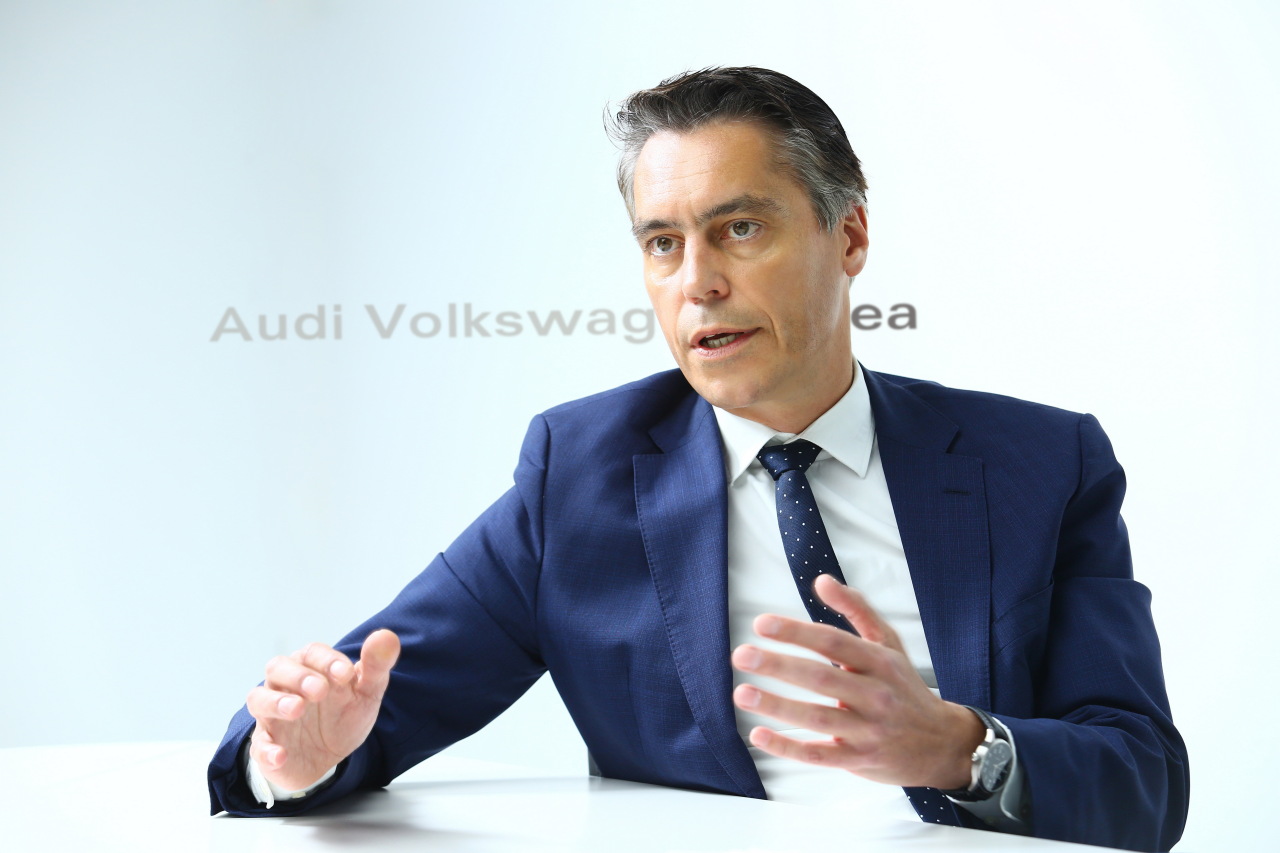The two-year hiatus in South Korea where Audi Volkswagen Group held years of market leadership has been a lesson to reorganize its operational structure and restore strength for another leap forward, according to a top executive.
Audi VW Korea Group Managing Director Rene Koneberg told The Korea Herald that the company is “back on the track” to regain market leadership next year, armed with a wide range of lineups and customer services reinforced in line with restoration of public trust.
The Korean arm of the German carmaker sells four key auto brands here -- Audi, VW, Lamborghini and Bentley. The de facto holding company of the four brands has been taking the lead in restoring customer trust following the emissions-cheating scandal that led to sales suspension for two years.
Backed by its revival campaign, this year, Audi returned to the market with five models: A3, A4, A5, A6 and Q7, quickly becoming the No. 3 importer in September and October. VW sold over 3,000 units of the Arteon since its launch in May, while relaunching its bestselling model Tiguan in October.
Bentley also launched the V8 engine lineup with Bentayga, but it was Lamborghini that notched the highest annual growth of 1,200 percent.

Audi Volkswagen Korea Group Managing Director Rene Koneberg (AVK)
Lamborghini is “flying,” he said, highlighting that the supercar brand received 130 orders as of October, exceeding the 100-mark of annual sales for the first time since its entry here. By the end of the year, it is targeting sales of over 160 units, he said.
“I would say we are (back) on track, but for me it is important that we build a full product portfolio for the next few years. We want to be a leading importer here,” said Koneberg in the freshly renovated headquarters in Seoul.
“I am very confident because, as I mentioned, our organization stabilized (and) collaboration with the government is very close. Because of the positive developments, that there will be growth. We are hoping to get market leadership again in the future.”
Looking back on the efforts made for a fresh start, Koneberg said the hardest part was to keep its stakeholders -- employees, investors and dealerships -– motivated to revive its scandal-hit operations here.
While enhancing communication with the Korean government as well as the head office in Germany, Koneberg has turned his focus on planting a new work culture within the group.
“We wanted to flatten the hierarchy in the company, talking more to each other, and also encouraging open communications,” he said.
Fostering local talents was also an important task, to offer employees a chance to climb up to the middle and higher-level management positions.
“Looking after our employees, meaning that we want to develop talent within the organization, especially young talent is important,” he said.
“We give young people the chance to join management in my organization here.”
Ensuring that the German carmaker’s future continues to grow here was also a major task.
Through a list of corporate social responsibility projects, including the Tomoroad initiative, the company has been seeking to establish a cultural and educational platform for future mobility.
Tomoroad, a combination of the words “tomorrow” and “road,” is part of the company’s “Mission 5” strategy, announced last year. It pledged to pursue five strategies over the next five years with the aim of improving customer satisfaction, social responsibility and internal efficiency, while acting with integrity and recovering market leadership.
Asked on a possible change in its product portfolio by bringing more green cars, Koneberg said the company’s plan will be in line with the government’s initiative in zero emission cars, as well as changing customer perception toward the future technology.
“In 2030, we are also looking at EVs taking at least 25 percent (of all new vehicles sold in the market). A major push (by VW Group) at the moment is electric cars,” he said, adding that Audi is working with Korean carmaker Hyundai Motor for the development of fuel cell technology. VW Group plans to become CO2 neutral completely by 2050.
The infrastructure for EVs in Korea is relatively strong compared to other markets and VW Group will bring its advanced charging system here to make the process shorter, he added.
When asked of the possibility of launching its own mobility service, Koneberg said a pilot testing of a ride pooling service of VW Group called MOIA is underway. And he feels “positive” about the new service while declining to give further details.
Koneberg came to Korea in 2017 and took over as head of Audi VW Korea Group when the emissions-cheating scandal swept the car market here, sparking heated criticism from thousands of customers. Before the scandal, Audi VW was among the top foreign car brands here in terms of sales. The German executive joined the company in 2000 and has held management posts in the Middle East, China and Hong Kong.
By Cho Chung-un (
christory@heraldcorp.com)






![[Graphic News] More Koreans say they plan long-distance trips this year](http://res.heraldm.com/phpwas/restmb_idxmake.php?idx=645&simg=/content/image/2024/04/17/20240417050828_0.gif&u=)